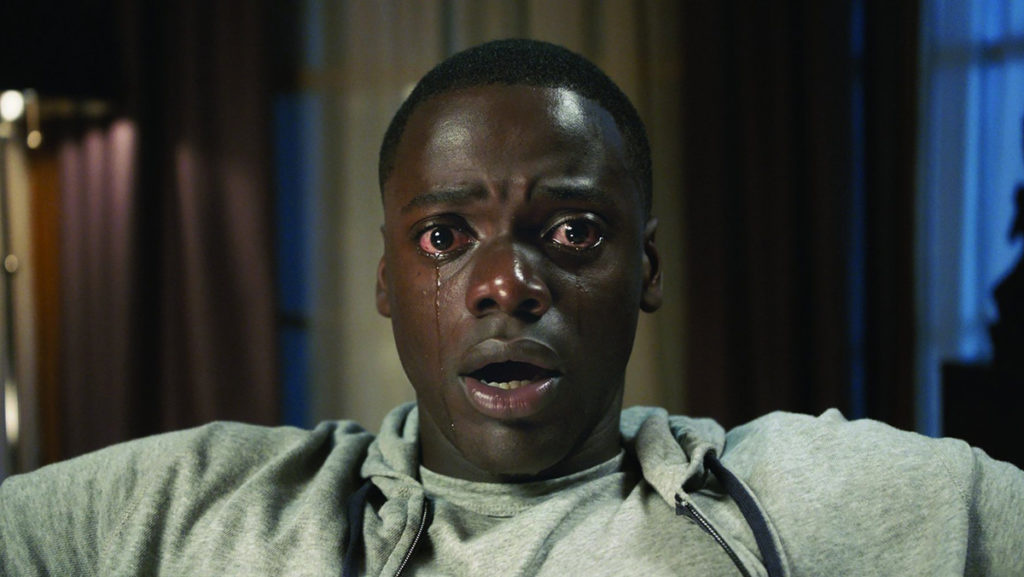Coming off his hit comedy show “Key and Peele,” Jordan Peele has proved that he has far more to offer than just laughs. Releasing during an incredibly politically and racially charged time, “Get Out” is both timely and incisive. Its political and racial message permeates every single frame of the film, and it’s all the better for it.
“Get Out” is a movie about a young black photographer named Chris (Daniel Kaluuya) who leaves home to meet the parents of his white girlfriend, Rose (Allison Williams). The film builds on racial paranoia from the beginning, as both Chris and his best friend (Milton Howery) immediately question whether or not Rose’s parents are racist. Chris seems to be fairly used to small amounts of racism in his everyday life. This is indicated early on by his willingness to give his driver’s license to a police officer, despite the fact that he and his girlfriend were merely reporting a deer they hit on the road, and Chris wasn’t even driving — Rose was. However, once he arrives at Rose’s house, Chris starts to become suspicious. While Rose’s parents, Missy (Catherine Keener) and Dean (Bradley Whitford), are quite nice and attempt to be respectful, their actions betray a clear discomfort with Chris’ race. From there, mere glimpses of racism — like a recurring joke about the father’s willingness to vote for Obama for a third term — escalate to horrifying and dizzying scenarios of brutality and violence.
This movie doesn’t rush to that violence, though. In fact, “Get Out” is an impeccably paced film. Not a single scene in this movie feels unnecessary, instead constantly building on the plot and themes of racism, mental health and paranoia. It’s this steady and precise build in tension that makes for the film’s best feature. While many horror movies have a difficult time concluding, “Get Out” has an excellent ending, providing one of the most visceral and satisfying sequences of the last few years. The last 30 minutes of this movie feel like an adrenaline shot straight to the brain. They are worth the price of admission all on their own.
This isn’t the only aspect the movie has going for it: The acting is also top notch. Special props should be given to the lead actor. Kaluuya imbues his character with a natural charisma that propels him through the movie. Not only that, but his ability to sell the comedic elements of the script as well as the mind-blowingly freaky portions is commendable. One scene where Rose’s mom hypnotizes Chris stands out in particular. Both actors effectively elevate the emotion and complexity of the scene while simultaneously keeping the characters grounded despite the increasingly disturbing scenarios in which they find themselves. It should be noted the entire cast excels in painting a believable and unsettling portrait of racism taken to twisted, surreal places. Rose’s family is both human and horrifying, while their servants are absolutely eerie.
When it comes to tone, Peele’s work on five seasons of “Key and Peele” shines straight through. His ability to balance comedy with the movie’s dark and surreal tone is reflective of the duo’s very best skits on “Key and Peele.” The movie never feels like it loses track of its horror or comedy influences, and they work in beautiful tandem without ever getting in each other’s way.
Peele’s direction screams a boldness that one would expect from a filmmaker decades into his career, much less someone on his first feature. It’s the kind of boldness that could’ve gone terribly if it weren’t crystal clear that Peele has an incredible command over tight, effective storytelling.
The movie isn’t without its flaws, though. While the film’s scares and jokes are almost entirely solid, not quite all of them land. Fortunately, the movie’s pace is fast enough that these missteps never cause a scene to fall flat. The movie also fails to fully explain how the mother’s hypnosis works, which distracts from the big scares of the film, as it’s hard to fully grasp how certain things are happening. There’s also a man in medieval armor abducting someone in the opening scene of the movie that’s bizarrely absent from the rest of the film. The knight is one of the most striking visuals in the film, yet it’s never used effectively — its inclusion in the film is noticeably out of place. While these plot inconsistencies are annoying, they aren’t detrimental to the overall quality of the film.
“Get Out” is one of the first must-sees of the year. Its bold writing, precise direction, solid scares, amusing jokes, fearless racial themes, stand-out performances and cathartic third act all coalesce to form a superb whole.
If nothing else, “Get Out” is a loud and proud assertion to the world that Peele isn’t going anywhere.




















